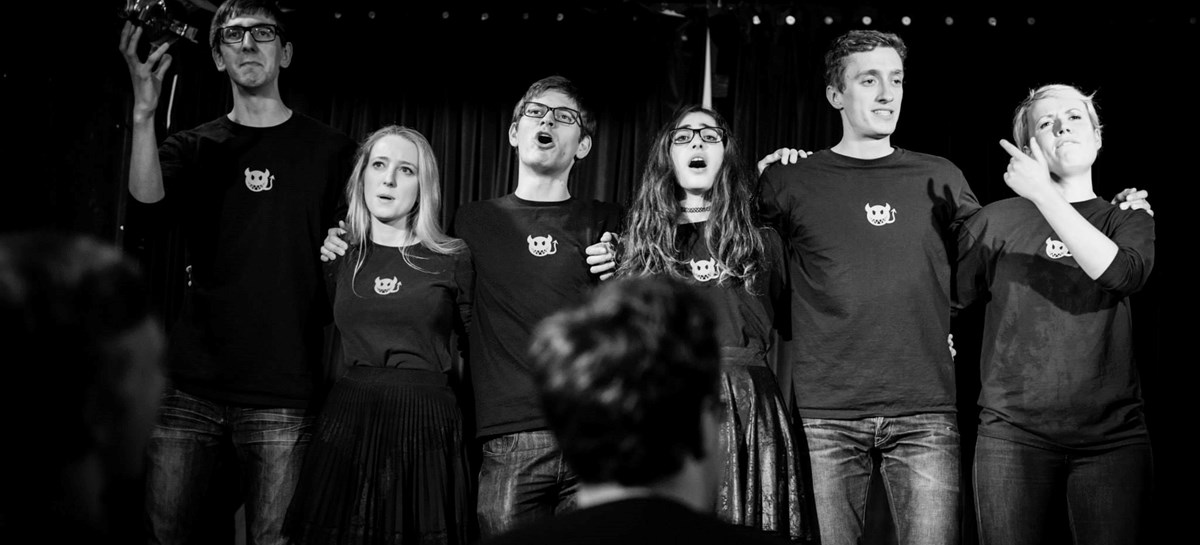
Just Say “Yes:” Improv in Oxford
My best leadership experience at Oxford by far was directing The Oxford Imps improv troupe. This may sound strange to readers who see improvised comedians as attention-hungry desperados rolling around in the mud and mumbling about “group mind.” While I concede that such expectations could be a lot less accurate, improv is a complex, enlightening artform. I would like to briefly discuss what improv can teach us about working with others.
If comedy scientists reduced improv to its most basic unit, I think they would find the phrase “yes” buried beneath lush layers of philosophy and structure and games. The essence of improv’s creative force is the affirmative, without which the reality of any story may crumble. As an example, imagine one improviser precociously begins a scene by saying, “This certainly is a fine sewer.” Another improviser, if she is possessed with the same sagacity as her scene partner, will think: “Yes, if this is a sewer—and a fine one at that—what else might be true?” If, on the other hand, the second improviser rejects the first idea, proudly stating, “This is no sewer, it’s a police station,” things move into uneasy territory. Besides the first improviser’s confusion and hurt feelings, think for a moment of the audience. They, innocent, shivering creatures that they are, are faced with a paradox. Is this a sewer? Is it a police station? Is it a ham-fisted metaphor about the rotten state of police work in society? They no longer know what to believe. THE FABRIC OF REALITY HAS BEEN RUPTURED.
“Yes and…” is perhaps the most inescapable improv term. It refers to the principle that improvisers should accept and build on the offers they receive from their fellow performers. This does not mean that improv scenes can never have conflict or disagreement, but that part of the contract of creating a slipshod improvised reality with people who don’t share your brain is that you have to work together. Rather than being surprised when another performer makes a scary, unexpected choice, it is each improviser’s responsibility to embrace such shifts without judgment. The frightening, fast-paced combination of different minds inevitably leads to imaginative situations that would not have been independently reached by any constituent performer. Improv teaches us to step towards risky and unforeseen decisions rather than to retreat from them.
Thus, there should never be one leader in improv. Every performer must simultaneously lead and follow. As a director, this placed me in a peculiar position. In improv it simply is not appropriate to guide others from a remote, sheltered outpost. If every scene is a process of leading while following then directing was a process of teaching while learning. I was constantly forced to challenge my prejudices and leap into scenarios for which I had no procedures. Directing improv, in many ways, was an exercise in letting go of all the warm, comforting things that leadership positions can provide: security, confidence, intellectual validation, the reassuring throne of “authority.” In improv, if you want to be listened to, you’d better be damn good at listening.
If all this has sparked your interest in the addictive, frustrating art form that is improv, I highly encourage you to give it a try. And if you happen to be in Oxford, check out the Imps performing at the Wheatsheaf Pub, every Monday night at 8. They’re real nice folks.
Thomas Toles (Prairies & Wadham 2013) is an instructor of literature and film at the University of Winnipeg. Whilst a Scholar in residence, he studied for a Masters in Film Aesthetics and a second Masters in Child Development and Education. Follow Thomas @thomastoles and for more information on The Oxford Imps improv troupe see here.